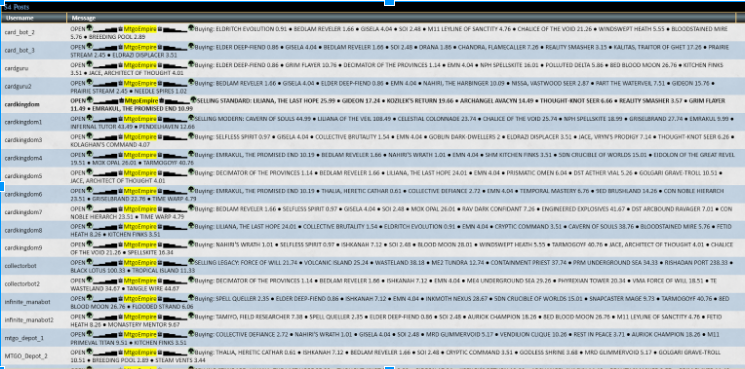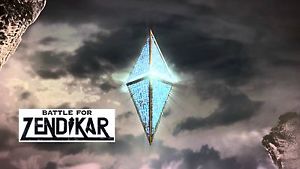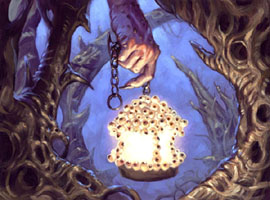Are you a Quiet Speculation member?
If not, now is a perfect time to join up! Our powerful tools, breaking-news analysis, and exclusive Discord channel will make sure you stay up to date and ahead of the curve.
Today, we’re talking with Casey Stewart, founder of MTGO Software Solutions (MTGOSS) and owner of several bot chains, including Card Ally and The Card Nexus. He's a longtime QS member and, as you’ll know if you've seen his comments in the forums, one of the top experts on how the Magic Online economy works.
Casey has developed a software platform that is used by about 25% of bots on Magic Online, including MTGOEmpire, JudgeBot, Drakebot, and Blue Dragon. He has offered to answer some questions and provide some insights into the MTGO economy.
Quiet Speculation (QS): How did you decide to get into botting?

Casey Stewart (CS): In 2009 I was attempting to make the gravy train on the Pro Tour. "Play the game, see the world" had a lot of appeal for a guy who grew up poor and had barely left East Texas, much less the country. I played Pro Tour Kyoto in early 2009, and while I did terribly at the Pro Tour, I loved traveling to Japan, meeting so many new people and experiencing a culture so different from my own. So after that Pro Tour I doubled down on Magic and slacked off on college.
This was mistake number one. Mistake number two was that instead of getting a job I decided to grind MTGO events. I entered two or three Daily Events at a time, playing 80+ hours a week for nine months straight. It was great at first. By the end, though, it had become obvious the grind was a bad place for me to be.
I started hanging out in the Auction room on V3 towards the end of my grind, as it was basically the only place people chat on MTGO. There I started noticing arbitrage opportunities and taking advantage. Eventually it got to the point where I was making more money on arbitrage and speculation than I was by playing tournaments.
So I started doing arbitrage full time, and redeeming sets as well. This was right at Magic 2010 when there was a massive shortage of cards in paper so redemption was lucrative (around 50% margins). Around Worldwake I opened my first bot chain (“_____________fatbot1-3”). From there it has mostly been a logical progression.
QS: Is it a lot of work?
CS: Like a lot of things in business, the more you give to your bots (capital, time, etc.) the higher your earnings will be. What separates botting from most things in business is that after the initial setup you can coast along and still make money. Your earnings will not be maximized but you’ll still be making strong profits. This is true at least for our software.
QS: What makes your bot software unique?
CS: Before MTGOSS, all of the bot software on MTGO had been made by programmers guessing at what is needed to run a bot network. Our software was created ground up. I was in control of the specs, and with several years of experience running a bot at that point, so I knew what was needed. Rather than take something a programmer made and try to make it functional, we started with a question: what is needed to run a large complex business?
Our software is designed specifically to scale a business. Opening more bots on our system gives you economy of scale in terms of work and capital requirements.

QS: What are some things people get wrong about the MTGO economy?
CS: The biggest misconception is underestimating the impact of redemption on MTGO and paper. Redemption takes full sets out of the digital economy and brings them into the paper economy. Without redemption the MTGO economy would fall apart, like it did during the V3 switchover.
Drafters on MTGO produce thousands of sets worth of new cards a week. But there aren’t thousands of new Constructed players to soak up that demand. Redemption is where all the excess goes until price equilibrium is met. While the market for paper cards would not fall apart without redemption, the cost to play Constructed would be much higher, and it would be much harder for players to find the cards they need.
QS: How are prices established in the MTGO economy? It seems like a couple major bot chains—MTGO Traders, Marlon, Cardbot—have an out-sized influence on buy and sell prices. Their prices are picked up by MTGGoldfish and, if I'm not mistaken, form the baseline for MTGO Library bot prices. How does this all work? Has this so-called "cartel" been affected by the entry of new bots like JayBots and Goatbots?
CS: That group—MTGO Traders, Marlon, and Cardbot—has an outsized influence because they all have identical buy/sell prices combined with a large market share. Individually, none of them would have enough market share to set prices, but as a group they do. So prices reflect a mix of supply, demand, and whatever algorithm the cartel is using. Basically, they say what prices should be.
Everyone else uses them as a baseline. Sometimes we—that is, all bots not in CardBot's group—charge more than their sell prices based on our inventories. Oftentimes we charge less.
QS: A lot of QS readers are either new to speculation or new to MTGO. What advice would you offer them as they seek to understand how the Magic Online economy works and how to profit?
CS: This is more of a general thing I wish people understood. “Sure things” rarely exist because of the very nature of speculating. As soon as a large enough group of people “know” to buy shock lands because they will go up, they raise the floor (because they increase demand early) and they lower the future ceiling (because they increase supply later). Look at all the "sure things" from the past few years: shock lands, fetch lands, Thoughtseize, etc. All have fallen flat.
The old adage, “buy when others are selling and sell when they are buying,” doesn’t work once everyone knows they should be on the other side of that equation.
QS: Cyclical investments based on rotation and redemption cycles are more predictable. Are they something of a sure thing?
CS: More predictable, yes, but they are not a sure thing. Look at Battle for Zendikar (BFZ) complete sets for instance. Those have gone down since rotation. The issue is similar to what I outlined above. Once everyone knows something is a sure thing, they prop the price floor up and lower the ceiling, limiting or possibly even inverting the opportunity into a loss.

QS: What should someone know before they get into botting? Is JayBot accepting new clients? What kind of bankroll does someone need before botting becomes worth the effort?
CS: The margins are tight---this isn’t the opportunity it was six years ago when margins were 25+%; now things are in the 5-15% range. There is still money to be made, but you need to come in with enough bankroll to run a business ($10k+) and treat it as a business. There are a lot of upsides to botting as a business, though. It is liquid in a way that other opportunities don’t ever approach, the cost to enter the market is low, and the time requirements are flexible and work around your schedule more.
The annual ROI for bots in my experience across a wide variety of bot setups is around 150% yearly, assuming you reinvest the money as it is earned. This is based on a larger (10k+ invested) bot chain. Diminishing returns seem to happen in the 125-175k range, but until then the percentages are pretty consistent.
JayBot is accepting new clients on a limited basis. We are only really interested in people who are going to succeed in running a business, rather than people with “draft for free” aspirations. Nothing against those people; that just isn’t what our business is geared towards. We would love to talk to anyone interested in botting.
QS: What do you see as the future of the MTGO client? Hasbro has announced it is producing Magic Digital Next in the next few years, which will fill the gap between expert (MTGO) and beginner (Duels of the Planeswalkers). What impact will that have on Magic Online? Do you see the possibility that MTGO will wither away?
CS: My expectation given the history of Wizards of the Coast and software is that Next is at least three years out. I don’t expect any relevant impact on MTGO as WOTC doesn’t want to risk their second largest revenue stream.
QS: Without using more colorful language, it’s fair to say that people are fed up with the MTGO client. There’s a perception that Magic is losing out to Hearthstone, with its slick interface. Are you seeing less volume on MTGO?
CS: Every release is a record breaker for my software as a whole (year over year), even adjusting for growth on our end. MTGO’s demise has been drastically exaggerated.
QS: I saw that you've played in a Pro Tour and have had some success on the PTQ circuit. What types of decks do you like to play? What's your favorite format (Limited and Constructed)?
CS: I like drawing cards and durdling…mostly drawing cards, though. I currently have the griefer pair of Miracles in Legacy and Lantern Thopter Control in Modern. Personally I enjoy Limited over almost everything (favorite formats in order are Rise of the Eldrazi, triple Shards of Alara, and Shadowmoor-Eventide). After that, Legacy is a new passion for me, and almost feels like rediscovering Constructed the way it existed when I first started playing. The decision trees are deep, and the mistakes plentiful. Basically, I don’t like autopilot Magic.
QS: If the overlords in Renton offered you three wishes, what changes would you make to the client to improve MTGO?
CS: Get rid of binders (and bring back V3 binder view). Reduce the ridiculous lag and memory leak combination. Just bring back V3 with leagues.
~
That's it for today, dear readers. Thanks to Casey for taking the time to talk to us. If you have any questions for him, leave them in the comments and he'll take a crack at answering.
-Alexander Carl
@thoughtlaced









Hi Carl, Casey,
Good to hear that MTGO, its economy and player base is in much better shape than supposed.
Few questions for you:
1- Big changes just happened (or will) on MTGO (Redemption, Treasure Chest,…) I assume like previous times the end of the world won’t happen despite everything said and done. Is such a situation actually profitable for bot chains with big pockets? Do big bot chains adjust their strategy to stock more cards than usual, or do they just adapt to new prices?
2- So the redemption system is going to be radically different. How bad is that for players/bots in your opinion? Do you think that if prices are bound to free fall to the ground when redemption stops the supplies for these cards will also stop abruptly (since EV would be so low for those sets) and will in turn kind of stabilize prices not as low as one can anticipate (since still needed for Standard after all)?
3- Would you use bot chains to “speculate” (in addition to traditional bot business) in the sense that you would buy sometimes more cards than needed just to accumulate them? Or is that a practice you think is too different from regular online botting (where you would just keep your stock full independently of potential future price variations)?
Thanks!
I like this interview!
Loved it, a fan of Casey for sure. Also of Sylvain, so I’d also love seeing his questions answered 😉